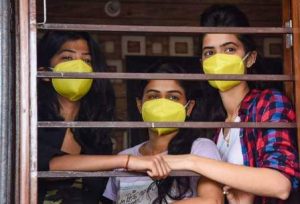Lockdown, Mental Health and Students
Almost every third student struggles to change following the "the new ordinary," or is terrified of the vulnerability in their future.
The COVID-19 pandemic has surged the world in its gallows. It has caused physical, financial and mental distress globally. The social distancing measures by nations made interruptions in everyday schedules. Schools have been suspended in 188 nations since 8 April 2020 as indicated by UNESCO. Over 90 per cent of selected students (1·5 billion youngsters) overall are presently out of education. Colleges and schools have shut their premises, and furthermore, nations shut their borders in light of lockdown measures.
in everyday schedules. Schools have been suspended in 188 nations since 8 April 2020 as indicated by UNESCO. Over 90 per cent of selected students (1·5 billion youngsters) overall are presently out of education. Colleges and schools have shut their premises, and furthermore, nations shut their borders in light of lockdown measures.
The advanced education establishments were swift to address the teaching issues with web-based learning, which had its benefits. What cannot be ignored is that these terminations have influenced learning and assessments along with other consequences of school closures. Students of all ages had their in-person school association cut off, losing actual admittance to their companions. Senior students all around the world have had their graduations dropped. Also, for an excessive number of students, helpless web network implied that they essentially couldn’t associate or take an interest at the level they needed. These circumstances speak to genuine misfortunes for the students and put a weight on their psychological and passionate wellbeing and can keep them away from progress. Many revealed to be feeling on the edge, disappointed and exhausted from being stuck at home and the ensuing absence of social collaborations.
Almost every third student struggles to change following the “the new ordinary,” or is terrified of the vulnerability in their future. They could start to encounter a high tension that will influence many parts of their careers on with their social associations, their actual wellbeing, and without a doubt, their presentation in their educational institution. There have been several agencies that have undertaken surveys to establish that to stay significant the students need to be readily subjected to physical interactions with their teachers and friends. Being compelled to self-confine, in this manner, is affecting the process of making friends and building up of an encouraging group of people to whom one is ready to share their issues. Furthermore, with regards to emotional wellness, we as a whole realise that having the option to share our encounters and identify with others is a critical piece of recuperation.
For children and adolescents with mental health needs, such closures mean a lack of access to the resources they usually have through schools.
In a survey by the mental health charity YoungMinds, which included 2111 participants up to age 25 years with a mental illness history in the UK, 83 per cent said the pandemic had made their conditions worse.
Also Read : COVID-19: Concerns on Girl Child Education and Wellbeing
26 per cent said they were unable to access mental health support; peer support groups and face-to-face services have been cancelled, and support by phone or online can be challenging for some young people. “They miss college, they miss their peers and they miss the string of activities that keep happening on campus. Most of all, they report difficulty in reconnecting with their parents which has caused them to feel severely frustrated. They also report a ‘loss of freedom’ with their parents around,” it read.
In an educational institution, students join from varied backgrounds. Some might come from a happy family while some have an abusive and stressful family background. Lockdowns have been a boon for some as they have spent time with families after years while for some it’s a curse that has been shoved down their throats. College understudies who must choose the option of re-visitation to their homes upon their school terminations might be dependent upon conceivably harsh circumstances. Schools and colleges had been an escape from the hostile background that homes of some children have been harbouring. Now that this escape has been taken away this has taxed a toll on the mental health of people and largely kids.
 The UNESCO Director-General Audrey Azoulay cautioned that “the worldwide scale, also the speed of the current instructive interruption is unmatched.” Therefore, the institutions have started strategizing their way out to help students deal with all the stress and mental trauma that they are being subjected to. UNESCO under its Sustainable Development Goal (SDG) 4: ensures inclusive and equitable quality education and promote lifelong learning for all has brought in the Minding our Minds campaign. A complete psychological well-being methodology is basic in limiting the misfortune students face during this pandemic. It will require the entirety of aggregate exertion and centre to guarantee that students are getting the consideration they need to succeed.
The UNESCO Director-General Audrey Azoulay cautioned that “the worldwide scale, also the speed of the current instructive interruption is unmatched.” Therefore, the institutions have started strategizing their way out to help students deal with all the stress and mental trauma that they are being subjected to. UNESCO under its Sustainable Development Goal (SDG) 4: ensures inclusive and equitable quality education and promote lifelong learning for all has brought in the Minding our Minds campaign. A complete psychological well-being methodology is basic in limiting the misfortune students face during this pandemic. It will require the entirety of aggregate exertion and centre to guarantee that students are getting the consideration they need to succeed.
Every educational institution is establishing or revamping the works of its mental health cell. It has been suggested that regular online counselling sessions for parents, teachers and students are an essential step that needs to be worked upon. Regular monitoring of stress levels to keep in check the psychological conditions of the students will help in the detection of a state of depression. In addition to these modern methods of problem-solving, yoga and meditation sessions are also recommended by doctors for mental prosperity. These have been proved to priceless devices that can utilise controlled breathing and centre to help even the most youthful students to manage their nervousness and disarray during this time of interruption. Some also suggest, on account of yoga, the open door for actual exercise brings considerably more advantages to the brain.
India’s new National Education Policy clarifies that there is likewise a necessary piece of Indian legacy and which should be paid attention to.
This implies that customary care rehearses are significant and extraordinarily Indian instruments are combatting in current high feelings of anxiety by revitalising their educational setup.
Also Read : COVID-19 and High-Skilled Migration in the Health Sector
With solid precautions taken, schools and colleges have reopened in most of the nations. As highlighted by UNESCO, the Indian government’s new National Education Policy clarifies, training is an “incredible leveller” that makes a fundamental pathway for understudies’ financial versatility, and the nation’s prosperity on the world stage in the long time to come. To secure this guarantee for the current age and India’s future, it is basic that students and their families as they manage the uneasiness, disarray and misfortune that our present pandemic has brought in. However, what’s also important is health both mental and physical.
The pandemic has presented our weakness to emergencies and uncovered how problematic the economies we have constructed can be. Interruptions on the scale we have quite recently seen are not restricted to pandemics, yet may likewise result from regular, political, financial and ecological confusion. Our ability to respond viably and effectively, later on, will pivot on governments’ premonition, preparation and readiness. Through their function in building up the abilities and aptitudes required for the upcoming society, schooling frameworks will require to be at the core of this arranging. This incorporates re-evaluating how the economy ought to develop to make preparations for difficulty, furthermore, characterising the abilities, instruction and preparing needed to uphold it. This additionally implies working in a close and coordinated effort with other government and the private is required to increment the allure and work market possibilities of certain callings, including those considered foremost for the normal great. As said by Andreas Schleicher, “The current crisis has tested our ability to deal with large-scale disruptions. It is now up to us to build as its legacy a more resilient society.”
